
Henry Hibbard Thatcher was born on the 15th of March, 1925, in Chattanooga, Tennessee, the middle of three sons born to Miriam Hines and Alfred Haviland Thatcher. Alfred’s family were Quakers, whose ancestors had immigrated to Chester County, Pennsylvania, in the 1680s. Alfred, an easy-going, quiet man with a dry wit, was an executive with the yarn-and-spinning business his father had founded. Miriam, though a distant descendant of the Mayflower pilgrims, was the daughter of a streetcar conductor from Baltimore, and had risen to attend Swarthmore College through her formidable intelligence and determination. She was a doting mother, who set high standards for her sons’ schooling, behavior, and—particularly—language.
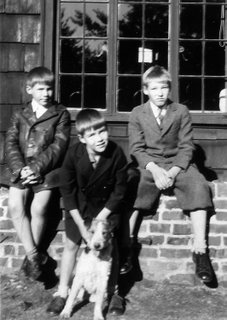 The Thatcher house, in the pines near the brow of Lookout Mountain, was a very comfortable Tudor-style with a well-stocked library at its heart. Hibbard, as he was called from birth, was rather shy and bookish as a boy; he spent hours at a time in that library. Years later he would read to his sons from books like ‘Just-So Stories’ as if from memory.
The Thatcher house, in the pines near the brow of Lookout Mountain, was a very comfortable Tudor-style with a well-stocked library at its heart. Hibbard, as he was called from birth, was rather shy and bookish as a boy; he spent hours at a time in that library. Years later he would read to his sons from books like ‘Just-So Stories’ as if from memory.Hibbard attended the Baylor School in Chattanooga, where he took honors in Latin, then went to Westtown, a Friends boarding school, in Pennsylvania. Graduating in 1942, Hibbard was faced with the question of service in the military. Following the Friends’ peace testimony, Hibbard decided he could not take up a weapon, and enlisted as a Conscientious Objector.
The first part of Hibbard’s CO service was manual labor, continuing Civilian Conservation Corps projects at sites like Cades Cove in the Smokies, a place he looked back on fondly in later years. But in 1944 he volunteered for harder duty: a medical experiment at Yale University in which COs were infected with hepatitis by Army doctors. Fundamental knowledge of the disease came from these trials, but at the cost of damaging the health of many of the young men, some permanently. After a long recuperation, Hibbard fulfilled the rest of his CO service as an attendant on cattle boats to Poland, where he saw the grim aftermath of the war.
Hibbard once wrote that he had spent many boyhood Saturdays in his father’s office at the mill, running toy cars along the windowsills, while his father pored over pages of figures; he knew he never wanted a job like that. But following CO service, Hibbard entered college without a strong sense of what he did want to pursue. He took classes at Peabody College in Nashville, where he wrote of his growing outrage at the ‘Jim Crow’ laws he saw around him, to the point of riding in the back of Nashville city busses with the black passengers. While visiting his brother David at Swarthmore in 1946, Hibbard saw Leadbelly perform, and like many young people at the time he was inspired to start learning folk songs, which he sang in his baritone voice, accompanying himself on a big Gibson guitar.
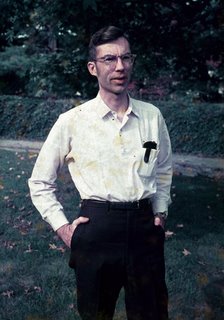
In the late 1940s Hibbard enrolled at the University of North Carolina-Chapel Hill, where he fell in with a circle of progressive-minded young people centered around the charismatic Presbyterian minister Charles Jones. The ‘Snuffbuckets’ were a fun-loving group, and besides their efforts to integrate the campus and town, they were given to folk music and folk dancing, which began a lifelong interest for Hibbard. He also joined a more radical group, the Fellowship of Southern Churchmen, and took part in more visible (though mild) civil-rights activities, such as hosting an inter-racial dance in Atlanta, for which he was cited by the police.
Hibbard’s activities sometimes came at the expense of his studies, and eventually he transferred to the University of Indiana, to pursue a degree in recreation. One weekend, at a folk dance workshop in Lexington, Kentucky, he met Ruby Yocum, a young graduate student there. Not quite finished with his degree, Hibbard moved to Louisville to take a job as a social worker with the Louisville Children’s Hospital—and to be close to Ruby, who had moved also moved there. In November 1955 they were married in the tiny chapel at the Pine Mountain Settlement School, near Harlan, Kentucky, where Ruby had once taught.
Hibbard and Ruby’s first son Alan was born in September 1956, and a few months later the small family moved to Nashville, where Hibbard had enrolled at the University of Tennessee’s Graduate School of Social Work. Hibbard worked on his MSW for the next several years while working full time, first at the Family and Children’s Service, then the Knowles Senior Citizens’ Center. He finally got his Masters’ Degree in 1964. He was active in the local chapter of the National Association of Social Workers, and continued civil rights activism on a personal level, such as serving on the board of the South Street Community Center in the Edgehill area.
During his earlier sojourn in Nashville, Hibbard had joined a small, informal group of Quakers for silent worship. Now there was a larger and more stable group, including Hibbard’s longtime friends Nelson and Marian Fuson, and the Nashville Friends Meeting was officially recognized in 1963. Hibbard was a very active and involved member of the Meeting, serving as clerk several times, and he was instrumental in the Meeting’s purchase of their first Meetinghouse in the 1970s and the present one three years ago. For decades, Hibbard was a regular at the regional Friends’ conferences and at the national Gathering of Friends, where he was well known for leading the dancing.
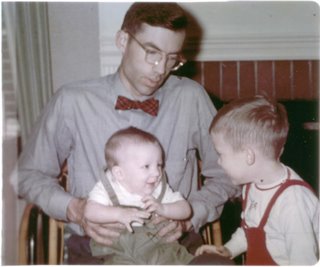 In 1960, Hibbard and Ruby’s second son Jonathan was born. In 1966 the family moved to the Battery Lane house, with its tree-filled yard, perfect for two active boys. For Alan and Jonathan, Hibbard was a dad who loved to get down and ‘rassle’ with them on the floor, and he could read aloud to them for hours. The comic strip ‘Pogo,’ with its playful, elaborate language, was a particular favorite. As they got older other activities opened up; Hibbard and Alan heard Eugene McCarthy speak in 1968, and marched together in the Mobilization Against the War in 1969.
In 1960, Hibbard and Ruby’s second son Jonathan was born. In 1966 the family moved to the Battery Lane house, with its tree-filled yard, perfect for two active boys. For Alan and Jonathan, Hibbard was a dad who loved to get down and ‘rassle’ with them on the floor, and he could read aloud to them for hours. The comic strip ‘Pogo,’ with its playful, elaborate language, was a particular favorite. As they got older other activities opened up; Hibbard and Alan heard Eugene McCarthy speak in 1968, and marched together in the Mobilization Against the War in 1969.Upon their move to Nashville, Hibbard and Ruby had soon found a folk dance group to join, mostly young couples doing ‘International’ dancing. Alan and Jonathan often dozed in the corners of church basements while their parents danced the Israeli ‘hora’ or Greek ‘hasapiko.’ By the 1970s Hibbard and Ruby were interested in specializing in traditional Appalachian and English Country Dance and they founded a group to do so. The Nashville Country Dancers grew and prospered, and Hibbard and Ruby taught and nurtured a group of young protégés who continue the group today. In the early 1980s, Hibbard and Ruby started the annual Playford Ball, which has become a nationally recognized gathering of English Country Dance enthusiasts.
Hibbard continued his social work career at Meharry Medical College in North Nashville, where he filled several roles over the years, including teaching. Hibbard had a passion for helping people, but it was a draining job, involving endless paperwork, and Alan and Jon remember him coming home very tired.
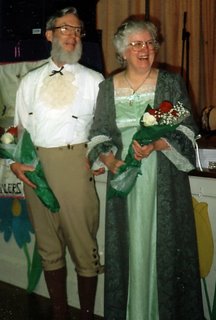 After Hibbard’s retirement from Meharry in 1982, he and Ruby spent a term at the Quaker retreat center Pendle Hill, south of Philadelphia, which also gave him a chance to be close to some of his Thatcher cousins. Over the next several years, Hibbard and Ruby traveled extensively. They went to Hawaii to visit Nelson and Marian Fuson, to China with a group of dancers from Ruby’s alma mater, Berea College, and twice to Europe and Great Britain with the Nashville Country Dancers. Hibbard also developed an interest in the Anasazi ruins of the Southwest, and volunteered one summer at an archeological dig there.
After Hibbard’s retirement from Meharry in 1982, he and Ruby spent a term at the Quaker retreat center Pendle Hill, south of Philadelphia, which also gave him a chance to be close to some of his Thatcher cousins. Over the next several years, Hibbard and Ruby traveled extensively. They went to Hawaii to visit Nelson and Marian Fuson, to China with a group of dancers from Ruby’s alma mater, Berea College, and twice to Europe and Great Britain with the Nashville Country Dancers. Hibbard also developed an interest in the Anasazi ruins of the Southwest, and volunteered one summer at an archeological dig there.Hibbard continued his activism and social service well into his retirement. He was one of the founders of the Nashville Peace and Justice Center and served on its board until his death. Hibbard volunteered and then worked part-time at Nashville’s Crisis Call Center, where he also assisted in training social work students.
During the 1980s, Hibbard became intrigued with ‘shape note’ gospel singing, using the Sacred Harp hymnal. He found a group in Nashville and joined his distinctive voice to their harmonies.
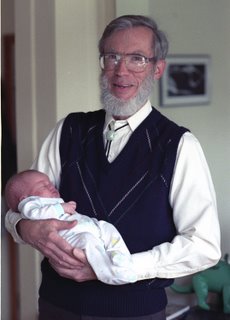 In 1991, Alan and his wife Diane had their first child, Alice, and Hibbard found yet another role, that of doting grandfather, which he relished. Once, hearing Hibbard reading aloud to Alice and Phoebe, Ruby remarked, ‘Well, Hibbard’s in his glory!’ Eventually there were four grandchildren, and Hibbard was happy to discuss them with anyone who asked, or even if they didn’t.
In 1991, Alan and his wife Diane had their first child, Alice, and Hibbard found yet another role, that of doting grandfather, which he relished. Once, hearing Hibbard reading aloud to Alice and Phoebe, Ruby remarked, ‘Well, Hibbard’s in his glory!’ Eventually there were four grandchildren, and Hibbard was happy to discuss them with anyone who asked, or even if they didn’t.In 2001 Ruby had a stroke that left her partially disabled, and Hibbard took on primary responsibility for her care. It was probably more than a 75-year-old man should have done, but he was determined. Still, he continued to keep up a regular schedule of Quaker events, Sacred Harp singing, and, of course, dancing.
In January of this year, Hibbard entered the hospital with pneumonia caused by a virulent strain of staph bacteria. He pulled through the initial crisis but was left weak and frail. He was mentally unfazed, though, and was able to entertain a regular stream of visitors, friends and family. There were long talks in his rooms and frequently music. He was relaxed, warm, voluble, witty, and gracious with guests and medical staff. In early August Hibbard developed an opportunistic infection in his lungs, and it quickly overwhelmed his weakened system. Before losing consciousness, Hibbard was able to blow Ruby a kiss. His end came peacefully, after all his family had gathered to say goodbye.
Hibbard was a small man in stature but he was large in personality and influence. He was known for his courtesy and kind, even courtly manners; as one of his dancing protégés said, he sometimes seemed like ‘someone from a previous age.’ He was a loving husband and father, and a steady, reliable voice in meetings or in song. He had a whimsical sense of humor and took a particular delight in the vivid use of language. He paid close attention to the world around him, and was always reminding us to notice the leaves in fall, the flowers in bloom in spring, or during his illness this year, the morning light in his hospital room.
Hibbard spent many years in peace and justice activities, working to make the world a better place. But more importantly, he made the world better simply by being here.
4 Comments:
Hibbard Thatcher was my grandfather, and I'm very sad to see him go. It was a delight and a privledge to know him at all.
Whenever I went to Grandad's - especially when I was younger - I could always count on a warm hello, a collection of stuffed friends on the stairwell, and more delicious ham than I could possibly imagine. Mmm, ham.
But I digress. Hibbard was, among other things, a wonderful folk dancer. I went to one of the meetings of his dance group a few years back. When I cooked up the courage to finally try to dance one out. Grandad was always there to steer you whichever way you were supposed to go. I think he did this for many people, in more ways than through dance, and I think many will be sad to see him go.
Phoebe
I am so glad that Ginger told me about this wonderful tribute site. What a loving and lovely biography. My visits with Hibbard and Ruby, mostly in the 1980's and early 1990's through my work with Friends World Committee, were too few and far between, but they were all memorable. I can't begin to imagine how many lives they have touched and blessed, and how far the ripple effects have gone.
Blessings to all who visit this site.
Quite some years back, there was an attender at Nashville Friends Meeting who was so enthralled with Hibbard's voice that she would call the Meeting House when she knew no one was there so she could have her friends listen to his recorded message on our answering machine! (She rather sheepishly confessed this several years later-I assured her Hibbard would take it in the spirit in which she meant it, one of admiration. I suspect he's chuckling about it even now!)
I remember Hibbard Thatcher from working at the Crisis Intervention Center (CIC). He was always so kind, not only to his fellow co-workers, but to the many, many people who reached out to the CIC for help. Hibbard's voice was distinctive...I chuckled when I read the earlier post from the woman who called the answering machine just to hear his voice. He is certainly revered by those who had the privilege of his company, whether it be in person or a trusted friend on the telephone.
Post a Comment
<< Home